|
|
|
Sort Order |
|
|
|
Items / Page
|
|
|
|
|
|
|
| Srl | Item |
| 1 |
ID:
115087
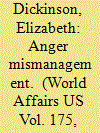

|
|
|
|
|
| Publication |
2012.
|
| Summary/Abstract |
Fourteen months ago, Ali was one of Bahrain's young, educated up-and-comers. The twenty-seven-year-old, with matted black hair and eyes that look too big for his skinny frame, worked as a chemist at the state oil company. Fluent in English and tech-savvy, he was happily married and his wife was pregnant. He was starting a promising life.
|
|
|
|
|
|
|
|
|
|
|
|
|
|
|
|
| 2 |
ID:
145926
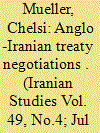

|
|
|
|
|
| Summary/Abstract |
From 1927 to 1932, wide-reaching negotiations took place between Reza Shah's court minister, ‘Abdolhossein Khan Teymurtash, and the British Legation in Tehran, the aim of which was to resolve all outstanding issues and to normalize relations between the two countries on the basis of a general treaty. This article examines these Anglo-Iranian negotiations with a particular focus on the thorniest issues—Iran's territorial claims in the Persian Gulf, particularly its claims to sovereignty over Bahrain, Abu Musa and the two Tunb islands. Though an agreement was never reached, an examination of the content and conduct of these negotiations offers some valuable insights into the unique features of Iranian nationalism and Iranian ambitions in the Persian Gulf during the Reza Shah period.
|
|
|
|
|
|
|
|
|
|
|
|
|
|
|
|
| 3 |
ID:
125075
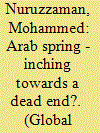

|
|
|
|
|
| Publication |
2013.
|
| Summary/Abstract |
A high degree of pessimism continues to hold a strong grip over the enthusiasts of democracy in the Arab world. In the last more than two years, the popular uprisings for social and political change have stalled in Bahrain, Syria, and Yemen. In Egypt, Libya, and Tunisia, where the populace succeeded in toppling the authoritarian rulers, the situation did not change that much. Violence, conflicts, and killings of political opponents disturbingly characterize all the Arab countries affected by the popular uprisings. In Syria, the government and opposition forces are locked in a deadly conflict with neither side being able to make a decisive breakthrough. The Egyptian army overthrew the country's first democratically elected government, headed by the Muslim Brotherhood, on 3 July 2013. On the whole, the success rate of democratization is so far disappointing. That begs the question whether the Arab popular uprisings for democratic change, what the media has conveniently dubbed the 'Arab Spring', are failing or still enduring.
|
|
|
|
|
|
|
|
|
|
|
|
|
|
|
|
| 4 |
ID:
156718
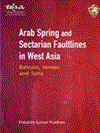

|
|
|
|
|
| Publication |
New Delhi, Pentagon Press, 2017.
|
| Description |
xii, 157p.hbk
|
| Standard Number |
9789386618054
|
|
|
|
|
|
|
|
|
|
|
|
Copies: C:2/I:0,R:0,Q:0
Circulation
| Accession# | Call# | Current Location | Status | Policy | Location |
| 059232 | 320.56/PRA 059232 | Main | On Shelf | General | |
| 059233 | 320.56/PRA 059233 | Main | On Shelf | General | |
|
|
|
|
| 5 |
ID:
168040
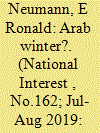

|
|
|
|
|
| Summary/Abstract |
AT THE height of Bahrain’s riots and protests in 2011 and 2012, some, including certain figures in the U.S. government, argued that Bahrain’s royal family had to give way to the protesters’ demands or be swept away by the tides of history. They were wrong. The protests were suppressed; the parties that voiced their demands were banned and their leaders jailed. Bahrain is recovering economically. Repression, it was observed, worked.
|
|
|
|
|
|
|
|
|
|
|
|
|
|
|
|
| 6 |
ID:
111597
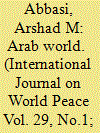

|
|
|
| 7 |
ID:
186788
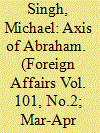

|
|
|
| 8 |
ID:
126918
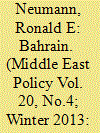

|
|
|
| 9 |
ID:
129588
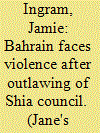

|
|
|
| 10 |
ID:
111228
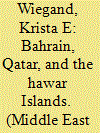

|
|
|
|
|
| Publication |
2012.
|
| Summary/Abstract |
The Hawar Islands dispute, resolved in 2001, is the only territorial dispute between two Arab states that has been resolved by the International Court of Justice (ICJ). Several factors played a role in influencing Qatar and Bahrain to resolve their dispute at the ICJ: 1) the inability of Arab states and the Gulf Cooperation Council (GCC) to mediate the dispute, 2) incentives for significant oil and natural gas reserves, and 3) incentives for bilateral and regional cooperation on salient issues between the two states. Both states have benefited significantly since the resolution of the dispute.
|
|
|
|
|
|
|
|
|
|
|
|
|
|
|
|
| 11 |
ID:
008685
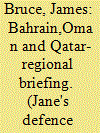

|
|
|
|
|
| Publication |
Sept 30,1995.
|
| Description |
25-35
|
|
|
|
|
|
|
|
|
|
|
|
|
|
|
|
| 12 |
ID:
115071
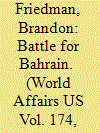

|
|
|
|
|
| Publication |
2012.
|
| Summary/Abstract |
After the popular uprisings that struck in Tunisia, Egypt, Libya, Bahrain, Yemen, and Syria, the surviving Middle East monarchies have come under heavy criticism in the West. Many believe it is only a matter of time until they are next. The conventional wisdom in the West is that this revolutionary change in the Middle East must be a positive thing. Popular demands for political freedom are viewed as part of the inevitable march of progress. Another implicit assumption in the West is that the monarchies, like the corrupt autocrats who have fallen, lack popular support.
|
|
|
|
|
|
|
|
|
|
|
|
|
|
|
|
| 13 |
ID:
152974
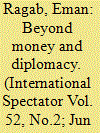

|
|
|
|
|
| Summary/Abstract |
The post-Arab Spring context created a window of opportunity for Saudi Arabia and the United Arab Emirates to reposition themselves in the region as countries capable of using not only money and diplomacy, but also military means in pursuing their regional policies. Their military interventions in Bahrain in 2011 and Yemen in 2015 uncover different aspects of the militarisation of their foreign policies. The permanence of the militarisation of their policies is, however, challenged by the type of interventionist state unfolding from these muscular policies, their domestic and regional legitimacy and the institutionalisation of this foreign policy pattern.
|
|
|
|
|
|
|
|
|
|
|
|
|
|
|
|
| 14 |
ID:
122175
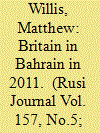

|
|
|
|
|
| Publication |
2012.
|
| Summary/Abstract |
Britain's longstanding and complex relationship with Bahrain was put under intense pressure by the unrest that spread through the Gulf state in February 2011. The kingdom's regional strategic significance, and its enduring dependability, make it a key ally for the UK - yet Britain's values-driven policy also compelled it to encourage negotiation and reform, rather than unconditionally support the Bahraini government's repressive approach. Matthew Willis analyses the bilateral relationship between the two countries, and shows how, so far, Britain has had little success in encouraging the Gulf state to reform.
|
|
|
|
|
|
|
|
|
|
|
|
|
|
|
|
| 15 |
ID:
105039
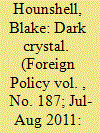

|
|
|
|
|
| Publication |
2011.
|
| Summary/Abstract |
In early March, California Sen. Dianne Feinstein, who heads the Senate Intelligence Committee, complained that America's spooks had failed to warn about the risks of uprisings in the Arab world. Instead, they had provided "nothing that we didn't read in the newspapers," she griped. "Whether it was Yemen, or Bahrain, or Egypt … nothing." James Clapper, the director of national intelligence, had been forced to acknowledge at an earlier hearing, "We are not clairvoyant."
|
|
|
|
|
|
|
|
|
|
|
|
|
|
|
|
| 16 |
ID:
108258
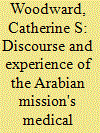

|
|
|
|
|
| Publication |
2011.
|
| Summary/Abstract |
In 1889 the pioneers of the Arabian Mission - a mission under direction of the Reformed Church in America - arrived in Arabia with the aim of Christianizing Muslims of the Najd and Arabian Peninsula. By the turn of the century, the missionaries were using medical knowledge and service as an interface for dialogue and evangelism. This article's aim is two-fold. First, it examines the history of the Arabian Mission and the history of medicine in the Gulf. Second, it explores the impact of the Americans on the Muslim communities from 1920 to 1960. To do so, it explores the experience of missionaries as well as the discourses missionaries constructed about Arabs and Arabia. It examines how the missionaries transcend the label of cultural imperialist, and how both the function and language of the missionaries evolved as oil wealth transformed the Gulf nations of Bahrain and Kuwait. This article, exploring the impact of the Arabian Mission from the late 1930s through 1960, continues the discussion published in the preceding issue of Middle Eastern Studies.
|
|
|
|
|
|
|
|
|
|
|
|
|
|
|
|
| 17 |
ID:
155956
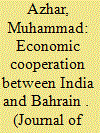

|
|
|
| 18 |
ID:
098962
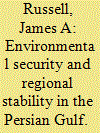

|
|
|
| 19 |
ID:
133597
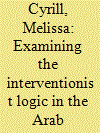

|
|
|
|
|
| Publication |
2014.
|
| Summary/Abstract |
At first glance, there was no coherent regional and international response to the transitions triggered in the Arab world since December 2010 as external players, both regional and international, had to confront with unceasing alarm the rapidity of change threatening to unravel in critical Arab states. However, as events in the region progressed, a pattern emerged to the external responses, one that was as predictive as it was differentiated. This was exemplified by the counter-revolutionary forces that were assembled against the transition in Bahrain on one hand, and the aggressively interventionist posture adopted towards Libya and Syria on the other. This inconsistency between activism and support for the supposedly democratic spirit of armed resistance groups, but inaction and silence towards the crushed non-violent public opposition elsewhere, clearly betrayed the interest-driven motivations of the external actors involved.
|
|
|
|
|
|
|
|
|
|
|
|
|
|
|
|
| 20 |
ID:
177692
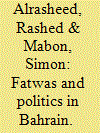

|
|
|
|
|
| Summary/Abstract |
Religious discourse has a fundamental impact on sectarian violence, stability and sovereignty across the Gulf region. Amidst an increasingly volatile political and social situation, fatwas serve as a prominent factor in the behaviour and beliefs of individuals and groups across the Gulf. Fatwas have long been a source of great interest in religious studies and international law yet very little work has been undertaken in politics. This article aims to analyse the impact of fatwas from Shiʿi and Sunni clerics in the promotion of sectarian violence across Bahrain in the aftermath of the Arab Uprisings. In this article, it will be argued that religious discourse has a significant impact in determining the nature of the political relationship between the components of society in Bahrain. We argue that fatwas serve a key role in regulating life across the island and, in the aftermath of the 2011 uprisings, in facilitating sectarian violence.
|
|
|
|
|
|
|
|
|
|
|
|
|
|
|
|
|
|
|
|
|